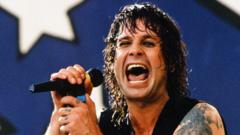The conclave following the death of Pope Francis reflects a crucial referendum on his legacy, with cardinals deliberating whether to continue his progressive approach or seek a new direction for the Catholic Church.
Cardinal Conclave Begins: A Pivotal Moment for Catholic Church's Future

Cardinal Conclave Begins: A Pivotal Moment for Catholic Church's Future
As cardinals gather to elect the next pope, they face defining choices about the legacy of Pope Francis and the direction of the Church.
The atmosphere in the Vatican is one of profound reflection and anticipation as cardinals convene for a conclave to select the successor to Pope Francis, who passed away over two weeks ago. The deliberations extend far beyond the selection of a new pontiff; they symbolize a critical referendum on the path laid out by Francis throughout his 12-year leadership.
In private briefings and daily meetings, the cardinals are engaged in discussions that will ultimately shape the Catholic Church's future. They are grappling with the question of whether to elect someone who embodies the inclusive spirit that characterized Francis’ papacy, or if a return to more traditional values is in order. Cardinal Anders Arborelius of Sweden, who is being considered as a potential successor, noted the diverging opinions within the group. "Some want to follow in the footsteps of Francis, while others oppose that direction," he stated.
Pope Francis was known for his progressive views and emphasis on inclusivity, making significant strides such as his statements advocating for marginalized groups. His revolutionary stance on issues ranging from climate change to economic inequality and LGBTQ+ rights showcased an effort to resonate with a broader demographic, including secular followers. His memorable quote regarding gay priests, “Who am I to judge,” highlighted the compassion that underscored his leadership.
As the cardinals embark on this momentous task, their decision will not only influence immediate church dynamics but also echo through time, impacting the faithful and shaping global perceptions of Catholicism. The conclave represents not just the selection of a new leader, but a pivotal opportunity to redefine the Church's role in today's increasingly complex world.





















